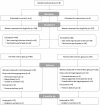Safety and efficacy of a lifestyle intervention for pregnant women to prevent excessive maternal weight gain: a cluster-randomized controlled trial
- PMID: 23865624
- PMCID: PMC3718707
- DOI: 10.1186/1471-2393-13-151
Safety and efficacy of a lifestyle intervention for pregnant women to prevent excessive maternal weight gain: a cluster-randomized controlled trial
Abstract
Background: Excessive gestational weight gain (GWG) is associated with short- and long-term health problems among mothers and their offspring. There is a strong need for effective intervention strategies _targeting excessive GWG to prevent adverse outcomes.
Methods: We performed a cluster-randomized controlled intervention trial in eight gynecological practices evaluating the feasibility and effectiveness of a lifestyle intervention presented to all pregnant women; 250 healthy, pregnant women were recruited for the study. The intervention program consisted of two individually delivered counseling sessions focusing on diet, physical activity, and weight monitoring. The primary outcome was the proportion of pregnant women exceeding weight gain recommendations of the Institute of Medicine (IOM). Secondary outcome variables were maternal weight retention and short-term obstetric and neonatal outcomes.
Results: The intervention resulted in a lower proportion of women exceeding IOM guidelines among women in the intervention group (38%) compared with the control group (60%) (odds ratio (OR): 0.5; 95% confidence interval (CI): 0.3 to 0.9) without prompting an increase in the proportion of pregnancies with suboptimal weight gain (19% vs. 21%). Participants in the intervention group gained significantly less weight than those in the control group. Only 17% of the women in the intervention group showed substantial weight retention of more than 5 kg compared with 31% of those in the control group at month four postpartum (pp) (OR: 0.5; 95% CI: 0.2 to 0.9). There were no significant differences in obstetric and neonatal outcomes.
Conclusions: Lifestyle counseling given to pregnant women reduced the proportion of pregnancies with excessive GWG without increasing suboptimal weight gain, and may exert favorable effects on pp weight retention.
Trial registration: German Clinical Trials Register DRKS00003801.
Similar articles
-
The effect of weight management interventions that include a diet component on weight-related outcomes in pregnant and postpartum women: a systematic review protocol.JBI Database System Rev Implement Rep. 2015 Jan;13(1):88-98. doi: 10.11124/jbisrir-2015-1812. JBI Database System Rev Implement Rep. 2015. PMID: 26447010
-
Lifestyle intervention to prevent excessive maternal weight gain: mother and infant follow-up at 12 months postpartum.BMC Pregnancy Childbirth. 2015 Oct 15;15:265. doi: 10.1186/s12884-015-0701-2. BMC Pregnancy Childbirth. 2015. PMID: 26472133 Free PMC article.
-
Effects of a lifestyle intervention during pregnancy to prevent excessive gestational weight gain in routine care - the cluster-randomised GeliS trial.BMC Med. 2019 Jan 14;17(1):5. doi: 10.1186/s12916-018-1235-z. BMC Med. 2019. PMID: 30636636 Free PMC article. Clinical Trial.
-
Offspring body size and metabolic profile - effects of lifestyle intervention in obese pregnant women.Dan Med J. 2014 Jul;61(7):B4893. Dan Med J. 2014. PMID: 25123127 Review.
-
Counseling and Behavioral Interventions for Healthy Weight and Weight Gain in Pregnancy: A Systematic Review for the U.S. Preventive Services Task Force [Internet].Rockville (MD): Agency for Healthcare Research and Quality (US); 2021 May. Report No.: 20-05272-EF-1. Rockville (MD): Agency for Healthcare Research and Quality (US); 2021 May. Report No.: 20-05272-EF-1. PMID: 34110725 Free Books & Documents. Review.
Cited by
-
Impact of maternal education on response to lifestyle interventions to reduce gestational weight gain: individual participant data meta-analysis.BMJ Open. 2019 Aug 1;9(8):e025620. doi: 10.1136/bmjopen-2018-025620. BMJ Open. 2019. PMID: 31375602 Free PMC article.
-
Can antenatal diet and lifestyle interventions influence childhood obesity? A systematic review.Matern Child Nutr. 2018 Oct;14(4):e12628. doi: 10.1111/mcn.12628. Epub 2018 Jul 1. Matern Child Nutr. 2018. PMID: 29962095 Free PMC article.
-
Prevention of Excessive Gestational Weight Gain and Postpartum Weight Retention.Curr Obes Rep. 2018 Jun;7(2):105-111. doi: 10.1007/s13679-018-0312-0. Curr Obes Rep. 2018. PMID: 29696560 Review.
-
Effect of diet and physical activity based interventions in pregnancy on gestational weight gain and pregnancy outcomes: meta-analysis of individual participant data from randomised trials.BMJ. 2017 Jul 19;358:j3119. doi: 10.1136/bmj.j3119. BMJ. 2017. PMID: 28724518 Free PMC article. Review.
-
Supporting women of childbearing age in the prevention and treatment of overweight and obesity: a scoping review of randomized control trials of behavioral interventions.BMC Womens Health. 2020 Jan 23;20(1):14. doi: 10.1186/s12905-020-0882-3. BMC Womens Health. 2020. PMID: 31973716 Free PMC article. Review.
References
-
- World Health Organization. WHO | Obesity and overweight. Fact sheet N°311 [http://www.who.int/mediacentre/factsheets/fs311/en/index.html]
-
- Kurth B. Erste Ergebnisse aus der “Studie zur Gesundheit Erwachsener in Deutschland” (DEGS) Bundesgesundheitsbl. 2012;55:980–990.
-
- MRI. Nationale Verzehrs Studie II - Ergebnisbericht, Teil 1. Max Rubner-Institut, Bundesforschungsinstitut für Ernährung und Lebensmittel [http://www.was-esse-ich.de/uploads/media/NVS_II_Abschlussbericht_Teil_1_...]
Publication types
MeSH terms
Associated data
LinkOut - more resources
Full Text Sources
Other Literature Sources
Medical
Miscellaneous


